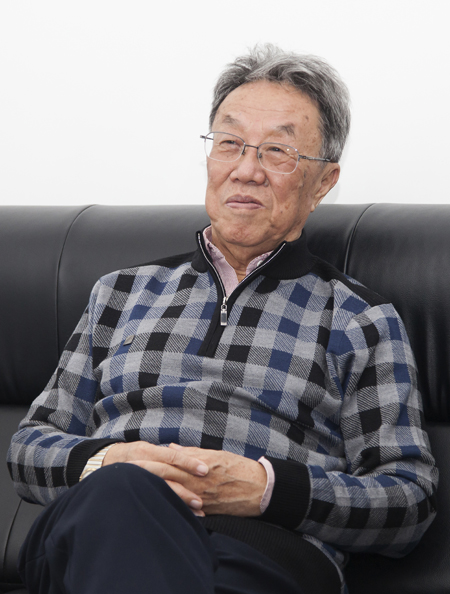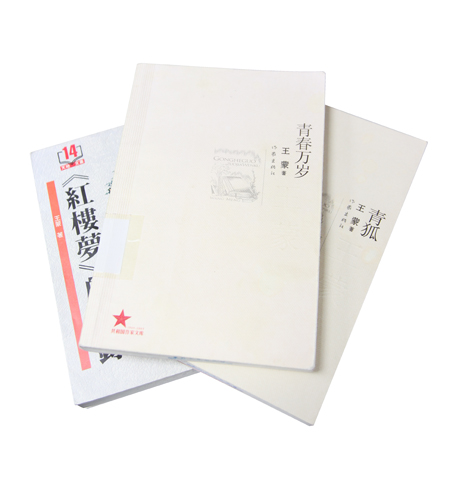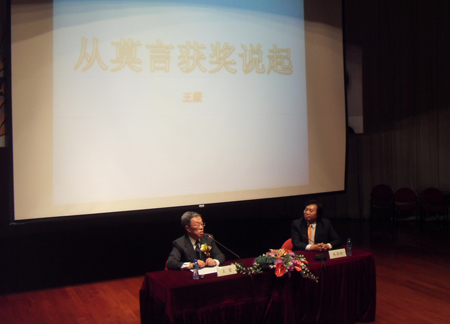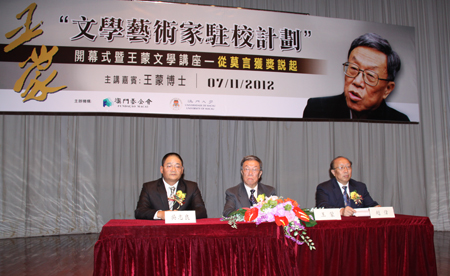Wang Meng
is one of most famous living writers in China, who has had a seminal influence on “new literature.” He has published nearly 100 works, which mirror the struggles of the Chinese people and the development of the Chinese society over half a century. Qing Chun Wan Sui (the title means “Long Live Youth”) and Huo Dong Bian Ren Xing (the title refers to a Japanese toy that changes shape when one plays with it) are widely considered among his best novels. Apart from literary creation, Wang Meng has also attained outstanding achievements in literary criticism and studies. He was a member of the 12th and the 13th Central Committee of the Communist Party of China, minister of culture of the People’s Republic of China, and vice president of the Chinese Writers Association. He received an honorary doctorate from the University of Macau (UM) in 2009, and became UM’s first writer in residence in late 2012 under the Writers-and-Artists-in-Residence Programme co-launched by UM and the Macao Foundation.
The University of Macau (UM) and the Macao Foundation co-launched the Writers-and-Artists-in- Residence Programme in 2012, and Wang Meng was the first writer in residence under this programme. During his one-month stay in Macao, Wang Meng carried out a series of tightly scheduled activities, including visits, lectures, sharing sessions and writing. He gave a series of lectures on Mo Yan’s winning the Nobel Prize in literature, attended an academic conference on the studies of his own works, which was co-organised by UM and the Macao Foundation, as well as an international conference on “the status and future of Chinese humanities.” He also voiced his three expectations for UM’s Department of Chinese, which are (1) making the department at once “international” and “Chinese” with the support of mainland China and through collaboration with Hong Kong, Taiwan and Chinese communities in other parts of the world, (2) developing its own distinctive character, and (3) fostering its own school of thought.
Wang Meng is one of the most prolific, active and inquisitive living writers in China and his connection with Macao goes way back. He visited Macao in 1997 and 1998 to give lectures. He received an honorary doctorate from UM in 2009. Although he had been to Macao a number of times, this time he still managed to take time out of his tight schedule to visit quite a few friends in culture, education, media, government departments and literature. He said that he could strongly feel how much the various government departments and community organisations in Macao value and support cultural activities. He was also gracious enough to accept our invitation to give an interview with umagazine.
J: Journalist W: Wang Meng
J: People say that Macao is developing quickly in recent years, with the pace of life getting faster. It’s not your first time in Macao, how do you think Macao is different from the way it used to be?
W: Oh it has certainly changed a lot. The first time I came to Macao was in 1997, if my memory serves me right. Walking on the street in Taipa, I didn’t see a lot of people, but I saw many new buildings. A friend joked that I should buy a house in Macao, since houses were cheap and the city wasn’t crowded. Now I’m back and I see more people, cars and shops. I’ve also heard that housing prices are a lot higher now. Taipa is more prosperous than it used to be, but it has lost its tranquility. Now it’s difficult to find some quiet place for a walk, so I’m looking forward to seeing UM move to the new campus, which may offer a better environment.
J: Macao used to be considered too mundane and quiet to inspire great literary works. What’s your opinion?
W: Some great literary works were indeed inspired by dramatic experiences in a turbulent time, but there are also literary works that were created in the quiet setting of one’s home. For example, Emily Dickinson, a famous and prolific American poet, lived a very simple and quiet life. So it really depends. But I think life in Macao could be very interesting and colourful, because Macao is a mix of different cultures. Actually UM is an interesting microcosm of this cultural melting pot. For example, some teaching staff at UM come from mainland China, some have worked or received education overseas, while others are from Hong Kong, Taiwan, Portugal or Europe.
J: Earlier you voiced three expectations for UM’s Department of Chinese, which are very inspiring. You mentioned that Macao should develop its own distinctive character. What do you think that might be?
W: I think it’s unnecessary to classify literature geographically. Should Macao literature only study Macao? Should Beijing literature only be about Beijing? Absolutely not. Literature should and can communicate beyond geographical boundaries. For example, nobody would classify Lu Xun’s works as Zhejiang Literature. Although he was born in Shaoxing, he also lived and worked in Beijing and Xiamen. It’s the same with world literature. Bernard Shaw and Oscar Wilde were both Irish, but their names were mentioned in England as well because they wrote in English. So Macao literature is not just Macao literature, but also Chinese literature, in that it is written in the Chinese language and by Chinese people. There are quite a few Chinese-Americans in the United States who write in English and whose works have had a very big influence in the English-speaking world, such as Maxine Hong Kingston, who writes about stories of Chinese labourers building railroads in the United States in the early years, and of course Amy Tan. So I hope Macao can make full use of its advantages, identify its unique subjects of study, and develop its own school of thought. I also hope that Macao’s literary world can be more embracing and tolerant and less influenced by ideology or political events. I really believe Macao could do very well in literary studies, writing and education. I once mentioned in one of my lectures that Macao should explore the possibility of launching a literary prize. I wasn’t joking, because Macao is in a position to do so, financially and academically. Of course such literary prizes take time to develop. Take the Swedish Academy for example. It started with only limited influence. It took the academy over a century to become a prestigious international brand. And it has an international focus rather than a local one. So it’s not a matter of whether Macao can do it or not. It’s a matter of how we want to do it. If the new campus can help to create a more open cultural atmosphere, UM should be able to host more writers in residence to increase people’s interest in literature.
J: In recent years Macao is placing more and more emphasis on developing the cultural and creative industries, in the hope of making some real progress in this area. Literature is a core component of the cultural and creative industries. What do you think Macao should do in this respect?
W: I can’t offer any specific suggestion offhand. But I’ve talked with some friends about the literary museum to be established here in Macao. I think it’s a good idea. Launching an artists-in-residence programme to create connections with international artists is also a good and feasible idea. As far as I know, the Macao Foundation is organising the publication of Macao literature in mainland China. Actually literature-related activities don’t require a lot of money. It costs much less to publish some books than to invite a singer to give a performance. The key is to do things that can produce the desired results. But there’s no need to rush. Just take things slowly.
J: You were the minister of culture of China, and you have accumulated rich experience in formulating policies to promote cultural development. What suggestions do you have for Macao’s literary creation?
W: I think what a government or society can do on the literary level is actually quite limited. Of course we can provide some support for writers, which is a common practice in many western countries. As far as I know, the Australia Council for the Arts and the British Council, which are semi-governmental organisations, provide financial support for artists. But mainland China, including the Chinese Writers Association, actually doesn’t have a lot of planning for literary creation. You can hardly blame them because how can you plan for writing? The most the mainland could do is perhaps organise field study trips for writers and provide rewards for particular subjects closely related to real life. But it’s not good for the government to do too much or too specifically. Writers usually don’t want someone else to tell them what to write about. We should leave literature alone.
J: Okay, the last question—what’s your take on the new campus?
W: Moving to the new campus is a huge thing for the university. [After the relocation] the whole situation will be different. A good campus can make people less restless, and perhaps more and more UM staff and students will participate in literary studies, creation and discussion. My biggest hope is that the university makes good use of the new campus.
(With thanks to Prof. Zhu Shoutong, head of the Department of Chinese at UM, for making this interview happen)
Writers-and-Artists-in-Residence Programme
Co-launched by UM and the Macao Foundation, the Writers-and-Artists-in-Residence Programme invites leading figures of the literary world from around the globe to come to Macao, in hopes of advancing literary and artistic development in Macao, strengthening Macao’s capacity to interact with world literature and art, enriching Macao residents’ cultural life, and enhancing the quality of cultural education at UM. Writers-and-artists-in-residence programmes have always been considered by universities around the world to be an important means of equipping students with knowledge in the humanities and of improving their writing skills. At the opening ceremony for the Writers-and-Artists-in-Residence Programme, UM Rector Wei Zhao warmly welcomed Wang Meng as the first writer in residence. He also disclosed future plans to invite, in the name of UM and the Macao Foundation, well-known writers and artists from China and abroad to work with UM, in order to enliven UM’s cultural atmosphere, increase Macao’s cultural influence, and enhance the quality of cultural education at UM. Rector Wei Zhao pointed out that compared to other universities which implement similar programmes, this Writers-and-Artists-in- Residence Programme at UM has three distinctive characteristics. The first is that people invited under this programme are all leading figures in the literary world with indisputable social and academic influence. The second is the university plans to extend the scope of the programme in the future to include distinguished figures from the artistic world to increase the programme’s influence. The third is that the university plans to build on the new campus a special venue that integrates the functions of a salon, exhibition hall, workshop, seminar and cafe, which will serve as permanent facilities different from a library, archives room or museum, not to be found at any other university in the world.
(With thanks to Prof. Zhu Shoutong, head of the Department of Chinese at UM, for making this interview happen)




